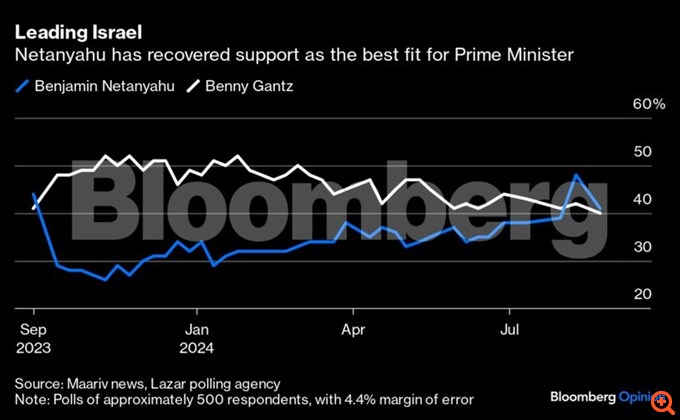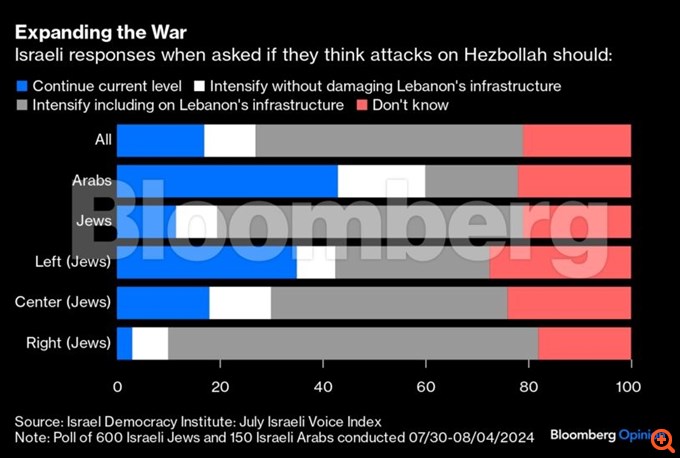Filenews 27 August 2024 - by Marc Champion
The vast majority of Israelis say they want a ceasefire agreement to bring back the remaining hostages to Gaza alive.
Most also say they are dissatisfied with the government and that their Prime Minister Benjamin Netanyahu is prolonging the war for personal reasons. So as talks appear to be stalling and the risk of a new war – with Hezbollah in Lebanon – seems closer than ever, one might assume that Netanyahu would be in trouble politically. Far from that, however, is the case.
Netanyahu's approval ratings rose this month to marginal levels along with Benny Gantz as the best man to lead Israel since the conflict began, according to a poll by Israel's Lazar news agency for the daily Maariv newspaper. And when the Israel Institute for Democracy asked if citizens want their country to expand the war to confront Hezbollah in Lebanon, the answer was mostly positive.
As I've written before, for Israel to open a second front of its own choice would trigger an unpredictable escalation that is likely to draw Iran, the U.S., and perhaps others, none of whom would gain from it. However, there is a significant portion of opinion in Israel that believes this is just the right time to clash with Iran and its proxies to whom it provides equipment. This is unlikely to change, since on Sunday morning the massive exchange of fire with Hezbollah was followed by statements from both sides indicating that they do not intend to escalate further for the time being.

The argument goes that while Hamas itself may not pose an existential threat, the greatest power it works with in Tehran does – and there will never be a better time to eliminate that threat than now.
That's because Hamas has largely been crushed as a military force, removing an arrow from Iran's quiver — Israeli settlements along the northern border with Lebanon have already been evacuated, in a condition for any invasion — U.S. forces have already been deployed throughout the region to help neutralize any Iranian backlash over Gaza or the assassination of Hamas leader Ismail Haniyeh in July – and the regime in Tehran has yet to develop a nuclear deterrent.
I asked Avi Melamed, a former Israeli security official I have found as a reliable interpreter, to help me sort all this out. The bottom line, he said, is that "Israel is now fighting for its existence, with the biggest threat coming from the Iranian regime, and I'm not sure people in the West understand that."
Much of the world may be focused on the existential threat ordinary Palestinians already face in Gaza, but as Tel Aviv sees it, Iran has spent decades building what Melamed calls a "stranglehold around Israel's neck," starting with Hezbollah and continuing with Syria's militias in Iraq. Hamas and the Houthis in Yemen.
Now he is trying to add Jordan to that climate, Melamed says. And once Iran has a nuclear deterrent, its umbrella will allow Tehran's proxies to act against Israel with even greater impunity. On whether there will be a conflict with Iran, he notes: "Now or later, it is inevitable." In fact, for some Israelis, the very reluctance of Iran and Hezbollah to start a war now means that Israel must do it, because it means that the other side is not ready.
I agree with much of this analysis. Iran, Hamas, Hezbollah and the Houthis are all open about their goal of eliminating the state of Israel. The October 7 killings and rapes provided a foretaste of what this could mean for Israelis in the future.
But before concluding that this is what Israel wants, it's worth digging a little deeper into the poll data. What they point to is a severely divided nation, with 20 percent of the Arab population often responding very differently from liberal Jews, and liberal Jews again thinking very differently from respondents on the religious and nationalist right.
So while most Israelis say they are dissatisfied with the government, for some it is due to Netanyahu's continuation of the war and for others to the failure to wage it more decisively. Similarly, far more right-wing Jews support invading Lebanon to counter Hezbollah than left-wing Jews. The result also paints a confusing picture: What most Israelis, regardless of faction, want is to take back the remaining hostages alive and eliminate Hamas at the same time. These are incompatible objectives.

There are really only two ways to resolve the war in Gaza: either through a mediated and internationalized solution between Israelis and Palestinians that aims to sideline Hamas and normalize Israel's position in the Middle East over time, or through a definitive showdown between Israel, supported by the US on one side, or through a definitive showdown between Israel, supported by the US on one side. and Iran and its many proxies on the other.
Neither Hamas' new political leader, Yahya Sinwar, nor Netanyahu is interested in the former. It is tempting to claim that Sinwar's desire to expand the war stems from desperation, while Netanyahu's stems from confidence in the combined firepower of the U.S. and Israel. But both scenarios worry me.
The first scenario is worrying, because the savage nature of the attack organized by Sinwar on October 7 suggests that he wanted to draw Hezbollah and Iran into the conflict from the start. This smacks less of despair than of strategy. Melamed believes it is possible that Hezbollah's message on Sunday that it does not want to escalate further with Israel will cause Sinwar to lose hope of extending the war and accept the amended ceasefire agreement still under discussion. I hope he is right. If not, it is at least worth considering whether it would be wise to give Sinwar the regional conflict he wants.
When it comes to Israeli self-confidence, military tools always seem more decisive than their softer alternatives, even though it has been proven too many times – in Vietnam, Lebanon, Afghanistan (twice), Iraq and now Ukraine – that this is more often than not an illusion. Israel is in a position that very few outside the country are willing to acknowledge, but a bigger war is less likely to bring the stability the country seeks.
Performance – Editing: Stathis Ketitzian
